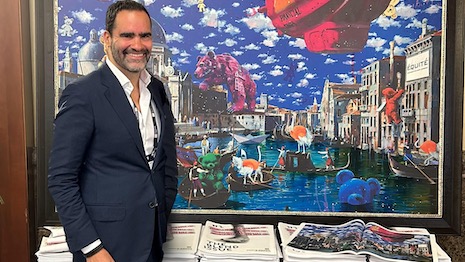By Daniel Langer
During a recent luxury event, I was leading a master class on brand storytelling.
The reactions of the audience were more than encouraging, and the consensus was that creating a compelling brand narrative is hard. The CEO of a luxury brand, who was present at the event, shared that he tried to create a distinct brand story for more than two years and failed.
Brand storytelling in the luxury sector is notoriously challenging.
Selling dreams
Similar to the example above, many brands struggle with storytelling in the luxury market because they misinterpret what resonates. The crux of the matter is clarity, or more specifically, the lack thereof.
At one podium discussion at the recent Financial Times Luxury Summit in Venice, Italy, a moderator spoke of luxury as “selling a dream” and described how important this is.
Indeed, many luxury brands proclaim to sell dreams, yet fail to articulate exactly what that dream entails, making their stories feel generic and diluted.
When everyone sells a dream, then no one does. Promising a generic dream loses its meaning and much more precision is needed.
Most luxury brands tend to focus their story on their ecosystem, highlighting what they do rather than how they make their clients feel.
This approach leads to storytelling that is more about the brand’s actions and less about its impact on the consumer’s life. Typically, I observe an inside-out view.
However, the essence of extreme value creation is not about features or achievements but to evoke a transformative experience in the consumer’s mind.
Luxury is fundamentally about anticipating a positive emotional transformation, as my academic research and countless projects have shown.
Here are a few reasons why most fail at effective storytelling. Our research suggests these shortcomings are at play when it comes to more than 90 percent of luxury brands.
Making connections
First, the dream offered lacks specificity: most brands use vague language or overuse the word “quality” without specifying how quality stands out.
This lack of precision fails to differentiate and significantly reduces the brand's perceived value. And this is fatal because the brand is always more important than the product.
Second, a common pitfall is that the story revolves too much around the brand itself—its history, craftsmanship and exclusivity.
While these elements are essential, they do not mean anything unless they connect back to the client's personal values or aspirations.
Hence, brand stories should be approached with the client's perspective in mind, defining the brand's role in the client's life.
Third, many brands confuse a brand story with a marketing campaign. Campaigns need to bring the story to life, but they are not the story.
Importantly, the story is only as powerful as the perception of it. Hence, the entire brand experience must deliver on the story's promise, which many brands fail to do.
If a brand story only exists on paper it’s worth nothing.
Standing out through storytelling
These common gaps set the direction for managers to focus on. First, be extremely explicit about the dream your brand sells.
This dream should be unique and detailed, setting your brand apart by clarifying exactly how it enhances the lives of your clients. Second, tell your narrative around the client's emotional journey.
How does your brand transform the consumer's reality? What exclusive experiences or feelings does it enable for them?
This shift from a brand-centric to a client-centric approach will make your storytelling more impactful. Third, use language that evokes emotions of the experiences you offer.
Mastering brand storytelling is a critical strategy that directly influences desirability, market share, revenue and profit in the luxury sector.
Don't just share what your brand does. Clarify how it makes your clients’ lives more beautiful, distinct and exciting.
Importantly, ensure that you don’t tell a category story but a unique brand story.
Elevate your narrative, give a promise of personal transformation and define the role of your brand in the client journey.
Luxury Unfiltered is a weekly column by Daniel Langer. He is the CEO of Équité, a global luxury strategy and brand activation firm. He is recognized as a global top-five luxury key opinion leader. He serves as an executive professor of luxury strategy and pricing at Pepperdine University in Malibu and as a professor of luxury at New York University, New York. Mr. Langer has authored best-selling books on luxury management in English and Chinese, and is a respected global keynote speaker.
Mr. Langer conducts masterclass management training on various luxury topics around the world. As a luxury expert featured on Bloomberg TV, Financial Times, The New York Times, Forbes, The Economist and others, Mr. Langer holds an MBA and a Ph.D. in luxury management, and has received education from Harvard Business School. Follow him on LinkedIn and Instagram.
{"ct":"XrR0Ae2iG45X9DN+XrIEBOmqDkxHX8n7J2IKBXaUn0aCJjY9SgJUyuKyw4obXuGxu6N8NUvlQN0WdSItUdwJQSaz\/ejOa5DWv2XI6LxY+WMq0OV8P0m3UmaJTarhopGkxz+B7798cbhm94JKMnbUNgLsvKr6zulwDewrKE59rrNCs0F01ETvo1Buyut7kzjJ7+0XOKbkE2DBVTkwtzfsaXePUsr5LRzsjHGz0OKfzdt0kK3jNPtFHe7wr\/rgJUbkRrri0akN5K1A8RYX4p0la5Wj4faVPFU8Thscyt\/czGrMMMAfEXMk6Xg+LAHxgIqbC6HDZiiPIgZqXTyv0W\/N4X6dBL8g+7Hcocs+k7xYWJZDyPKVg+R8wvqxqMutrA1gxw4ZqsOpqn+VlMeAbasEh9Zu3J6DYS0i5nBo05LH4m3qBhS5uCl5OZt5vLDrKYHMSMGsnyPAdsSNwWvYDc8mWohPr0ozlo9GcH8cySagp64bNrU7RZkLzSp5I4I4b8Y8wMG11UvYmKqyCThqBsz9jZ1cnc175aqNnYyU5rslkXfPC2BB7W0ZcYrn5Ngn\/xFsaOHBw0UmJwjTLNl+kBD2LuSU7CULq1zfhbtpnl\/5JatJmN35dtSzl24nD9JCaSzdBcduiOFE9cgSab6mWzGshGxWmC5b3kWtLmCvn2MvLBvZPVIZDNRxfE\/3+AD6kztKb6VZbJefSXrOnwFUHDCEh0qWSI4hhdvzoX7Pmi\/eqSAlYupV9qFyPzTTBcVfkZIHa0bNh5Zsb6MkWaZCoLrbkbP8Gq7Lv9VuDS4FJyhqI8zN7z7vHDFXMYvZiy+sfKCGGDF\/cPv0R5e6kb8U3gPUV3A\/qR7cUpUSrEfoEWXozdSX2XFN4JsGYFomO6tkjqjVOoGCXtKKTHBdhU5pGuG7pRNrypMytpBkSSNf6mK\/Ypi8Csd5h1SSB4GGE50xnsFSj\/Z99KtdKhUHwuxp7cUHQvtXdlHp3fxULvvxzPaj2+0lyqt\/GArfTKnCg4x5oZEdVdJIMMxoS\/KXAbk+3D5FSBxTqERUsASNn05E427miE86KNlLFqwINk72Sg04LiFMkSiGW6i0r1VS5V18nwrilyLdu8p73cFHcNhCia1c5euDpiZ2qb7Vr8oKojNTG211JSOQmxHBIj4t4ZPlz9GviZE8mk8Ng0tRcZM8xnjColuWGJko5nUTxAQnNWzht2v0QoCVheDs9Y+Drgpk9BJLAApPWxN1aPa2Re9xtW0YyvOQl3iWsJ6TvnRqqmoNKvNJWndD+dfxmgGbNFaDw9OqxkUjG64o55KIHdO0GVhzD1J6k+XcGxXotRtSpCi8LXpYhxEajpwKXzdH+ScpFsSQqBL57dq3xutX5iqS7rmtE2jVnc+E\/o4mgnGiRa8XToPYodQCK76GOpaKBSVecgo3ZBmtgzqVmnHt27qkr8gSHlhD7A\/Q+oo7RRcMbC18nCDDHte6R24hNSOE+xDAF\/\/EdHrfBQwOhd12IvQYdWtcvP6zC5uk9IBF70wcFO6bcqKKGkvVoAp+IYUfCRKpcQNu1Ex5aFJyUhPrrQRQk+9sW0hLG8uitbegktEipg6ih7YOLQWj9mg7ExYaoSeajHTI1N5lZlV+HPJHon4cAGFQfQbb55rMvPgdRe0jKgKe\/Og58ySecgc0RL+Q6zzVrRPRMwGzB5w5eydyzVBI8WWGINI5DdBTJgql4XbnnneeI0lRj70dzLjV2cBDWCvpcd5B3kztx5UzW3ER\/hdquXWZl7xMe4F09U3h12UwlNzaSTqCMSQDSLgZPfik+BcDQFkGZq3avdCAC31VrxqQMEWqQBTWpFsArh7eqDV4ZUVNyJXY9562etHa5sTkpOBuiVVw7MTCQ+PqbCCRCvyxklCtvzodzx1RrhsDoYT+f87hLVvGt+18SlBFaNG2XPNkFgnJ1+4fGHRtDb2GogCB++5PstBWT2deB\/CY9F47VZ59MTFgD72W9a1Z82qbmokbQomvpgidlto9Caa0zIomlAgjqF0WEni1p\/3P1X6BuUtJvHHiQrNmgO25bsTMhkg46Ss2UzXBCh7J0uTAfkjK43PLI+Nh9hnd2KxACtp1hVdZisPd+rzNXS9ShsoIqDLrdzl1mF09\/+8mEJLDZGeryNZUsU8\/Nt1iOd5Kiu\/qCj0geni1xtKW+C8RxPzmiI+epMepgdn8tC61lKzwcyJCcDc7DZc0DSXtqBy0VoQLLiQSTP1l\/7m7tAqnCyEKRrIklwara9\/nR3L26v0Y1y16\/fj+fCD+Q2ngsmThEDEQEjdz4Q5nTaj12nbZurtgxontE5+O3QV4i+MlSXbrZKEAfqv1Otef\/UMCuQDrWl9eDoMCHKKEVi8ZsuuLJDV0ntSadkA01xTQDcHogSHNvfdTrXGBcdIOImf2HiBsCke5\/T5YklRXYe8nKsqSraNU4b0FrjSGYEMPXOM9Ohz4sstr4uN+T4inWvJGLmakR1XAwVac042bE2cxrXyECxzMVrrQ0\/QuilGfiy\/II8Kcisva\/cK8Fu+Arix8XuURfA5f9lBdTYEdeNFncOy58M7qDWZtPlMOnceQHIxxHxYL7uAKjud6kHZPJRRF38etO26xcVKH74Kne9RcrA8P7Df9pDF\/Jm22wQQEj6ZUcTDxUA24SOxn9PxuoJDfrBNwEzUNI0KwYFrCehU0J5bu0m+CNYNID0PO2ipGmg2iuuG9LX7GqZAeHiX99PHfWJ6eMmWPUgi9tH8cQ3LsAQMmpdJxqWlPq6Y01OZ4kMYgr06IU7Ix7SYCSc4Twh25ejJ2SMlE6NFNuWpFMv3RS5+52Y4CQCTAkEXIhLFbY9kRdZMaX3hamERBaZmqnBQxoCtcdhR0FBU3Pn9RNrmtRVcMKHl9fDZZ1AnpW0vIPfLYN7Z1N7XHGpIbqxb5bIuZ7MMAoGe5cGcxrvyD2kHFZQd7OgYqerkseZ8Bula1poaC5GAbWI6jXdbi8TmrrHGTVSjXlEqi1oNXoyKnK5BgU153yCRG5RatYwxuG7nMoyPn+1a3PGXRaIJF22sPgIFkA0snumM\/vcZYGm5wsjXLCBWWNvDh5PuZY8g8q19mtACZd45xWMAo4UEY7b708NPHm29UYMuDy8MpwgeeN2DTvP\/DuFxb0aKRvLT4BcNnVTSj2RHkY7XGyIoTkVubheonFaXDgtZr+rRfKfk8YHmP4dQRrprGsCiLR6qfbhEALSk\/47aEOiHIWQda6drQxmKakRD+PTqyXfjv+cWAmR2CRcy9+5tKJX\/U8W58Lj5BFd9UU+7IfMMazFfdOG1OEUVELGXyPqunQE0tHmQatCsT6+PgXs4wfkf5mARQvSLUmi53HyJK8Wv2QKtqDplBE+SjA9QZcW3I12WJz1ipWvmnqqySORCTXYkEek0BHgNZuKUsdR5Wm000Zh5EnrG4CeOWeh5WBlEoBX8+zDWNPXsisHmxwMxdM1c+tf1+EYa77uEfSJ4dcjl437lsUcxE42C+st2\/h0GrcmpZqHIglXnLL5ioKtHhJ2VH4qM5\/oFUJiyEFPpDnUxbVSwqVak9vvUdgPwXELz66mFcyFCBQOlKpwtTKopdxgKg5H+4sxDFSoSbcBogow8VdBqnrPrzZ\/QkMRDIojo2A+E7PR8uciviFhviyAbpAsC+ugxwAObKkCJmKe8Qesvq7YFaZalvcSB2wuFWFhKIH7aKNh3SV6xzs95GoW5EVytU+fztPeUzQ3+ZzKB8Hwn7bQdpI+qgGAsxZY+1pKh6OF2hmLZtMDUgGApq1ksKltf\/09Av7ES98sW6S6sn8rxs+wWIzy\/eSQ9us4CvgK7WjUBVs4cmmw5fq8\/NgU5IZUavcdui4Bk0cHLGxGHumCKVymRuQw1pgkMOD5d+vahNCqNYcWKVvxg8OkkpXAIj3dZRYbyf2c1oMcUVDm6tR\/ucn8XGPKtz0c8Q0srJoLAGfh39bFxXzScuX\/5d\/4YFqsavvgVmBGI0Jyb6jGB1owJq3FId4V\/\/o9aT0H\/Pr5W1g2h3\/AKpWGvK7Kxcp0x9\/oEJnbXSNWj+rO6Zr\/Bvo6ygPvH\/QfXxOU8DxMhMulBnS\/2b9WmSBxvrKPGXwZUD7Up8CdrYlDpoAVO3Ryl+jSuHxZNIHi5NR6PxL4ktzHg9OPho71ecFqlWf3Ode68M5azfBzmqWTtnxtiRRo6K9wHac2Vr5lDjCPtZSVFieJ8gq6iPxCJ3v4UlP0MsCz\/WHAELLJLJeoVphJU3uMkxL1cPfWgXyCYuFgjxs3J7iNKrPD5gA9zCe8cZn4a7JLo2X2rsr8\/8b4RLRvS+\/6DX1ZV0ioUWrsZ8fT7ujzTZxvCyQbU75T9wiRhjh818Pm\/Z\/ATlEb\/tgpuQrMl\/Thh7gHadJMdMTSc9wLeJ\/x4xU16lAA8tPpMg3\/jsxH1A3tK+6SuUEt+Mznh1Y81Hi4j\/EUCDC3oszHTpvBd1dFa002u3m1J2eMXf2Rr1AXcwxsp0iq5cYXqpEqL9u3Uo6mVxZwlWBWHuL\/u6e51Dtk5K7SX9RgvtCz70hD9DvcULQmGlngC2ukHZPxfeeLG56cznbQ16Htl0RKfs1vhzhSxsBEtI+golwd5feITRYdmC7K2qSpDatCN3C6hdp55Q8\/7wQ0Bj0byly93ghtKOnTACnp4\/slDls003f67RAFqc4csqANzfNMCgrgGF8src4jeasndYs3qVhiO9GfzFJr8EQvnCCcXqke0sYpU4ukROuD4jORnD31bR1QxavH7TFnut+eYOX6BH3KE3EUXiE5pJZsWHPPw3\/OX0rH8RdYKek9ufymVpxJiDJYqX9V2mGyBlevLTO8KX7UYmX\/gFng01VZvYWzXl51IG8chu\/zNs2oYB58zIMTpY6CvZ+MNOneZ\/ezE0gTAfo3V6l1qTVxNe88EtBewRZ9Onitlve6IOZIj7g900j0eA+dbYzhT4Wqx2R9W4aW24ktGn3oI+LTr5dY5SpUqvn0pOLQ8dgsMHJmmE07sORUvmv839F+xEHnFvbFa8D44pAvzu9uc0IG+9WMHEnGwovdu6pJAC5kCDDh8VgK08XZxPC2ESgK0h\/FYv\/f6ZJAoYETp5lFAiMjKWc3kWYz9ZG0MqjEyt4ztMnrpydqqgaYfX5Dz3PZWhq4TDJSRnSrs8czjm2YcaOTx2mfSaq5w\/yirucMBTp6503LATGXAhOJgIhAuTwMhFC\/eQsu1zQhyqCsj\/xdVVhAl4onv8yLyWFMDz26SombTDxNr3WO7rENibK07qn3qNkDHGkXeAHXwEi\/8aR5QKBvOiUzkPl7iiP\/FLLJJs8SO\/BTETPyFlSXtrddgGvKy6SDt9mT9\/RR3m1Hf3T0wMBOA\/GOory6w\/vB4R0PB8nsbHCCwtykHATruDOUw3Jx2gYqT5+JcDiFWSizd8QBOVkTUCpeebPZBPzhgCNsAYnJLOJr6dttDVBudPggJ1fvu9CuygpxhBxRXPGjNFgdVU6IdoMEBaWdWygIQmT6jPQBTldY+WaB71q5eBZbKT+cebxh\/GvLh5Cx4hFLrPt09SlpOt5Sr2kfHcwh2FXj0qcZbTaI\/FDf91pUADnD++eq3ht+1BhmTTznsVhTJG9JGxPe61diLirMF5NXrPWLNViPrt68KfgCcUd\/FZpXhhpnzKFXbtd9WZbI13VzEStYwN5lut2tHSfnlH+PcHP9r7r8x9fKe0466iQncnBPX2xrv87FZfXJlrOfdyYJ\/OMEbxs44Z8HDLr4EYOgOz+5OaKSTR1NMkRrijRxLsbW8JvcwH8\/YPymHIC50DzGsh2sn3zm1XxeBHRcLvRVrwclKWZT9tpwvR4BweX1RhSbNAVi7V+0G8\/oiuU7rfgZMEGLi4Bdvgwik7cE6dZqAiEeqzTAc2VDATtuMvMkO5YJn9XGOvynnmaz3uV5ZrvmWVwmJuwRLxMSysRUkxaeYDbbWswhsmAzNWZrXGiU8v+flaueB5F44SDveQXiw9MxJyW+PxbsOEAcdGtfv\/Dc9d6Hh8HD5r31HHY6pSCHVGRT7fQRH9RI8JVxEqrKWb5P3C79wqfKsbKYlMa+zh+MOV0rWd5By9QjdCDvsY3AsFcSh4q0aOrvwbdHNIK5ttLTUSvcTrmFIdP8cjGJiRpYZlZCnL7Nyong+buhEN8gxWKMbJEkFX4VJO7qZdQLAAQU9ReQajXvIG+\/0n3FgJRZpsLZyVeRahFsSdp0TRwFQaiXnVcn9xGMCSGwbeKlCOwrzdstBrYkc2GLL9ULZa2sKbtaI2OEEYONpJw93QVO4jPfT0c0KJogc\/cYC6EDhUCp6UaBzrPaPQrq+ZjYBjo3vunLd6hA6CNPyCYbdS714VugVZIc00mALB\/9ygMwVXDF4zvqmb7CZ84Fn5jWDzmTp6I8eRNWVO43ylhKEozybaGudiwmVUTig6JJDEPGAnUAkamSvt2TXSjxd3NNnrsSQvk4X9QtuhUnCTsPUEiGUPWlcKJafC6yzcwjL\/bMn19XuYd1ZgM8cud8GQHkOC1Bn8jsfCZ6RBpw1W4vi90ebUsmtNpqPKzhSv9VDOTZLQE9+I97mNMid9TpV6Y5H+XL8MBf0N7MrpJdDce5DDI1ueTJnmio+ZNEbj0QJNtgp\/dlMebX4gzoB2rqIUOe4NhEDutzY\/cvE9El2YmJX6ywnn5TWU9+3SAepoaTAGVd5Le45yaNQ7DM1Jjo+H47R4gtT1uDFq+6+UXB+vWWtpXEDtP9Apd8uio+Ym3eCLGggnwQ6Pqv7BQs\/b87Dn3Bkp2S\/LNIwn+eAZFSVV78ZYcD\/1CfIYL5Mvm+X4lf8HqMNqosHAz3t\/i1t1k+KqU4VSk7VaWM8BLp\/bV+y\/5hDmjjh5pk++BEe\/G8dIQwpjPYaQ6A5zmbV3vErVciiXCYtbMZE\/VCHU6ynpLNGuMctCR1vIbr\/P0uXl9HH127MWcpjkx+nne2mtkmEIiwBCuN5cn0AZNlFMovEuXBlUSl0DK9pgNhCtb+F9+O+kLY11wMyiOduyIXSV1aHal2vgprOO4OmXiIP7BTTDxTB4aw2\/zYx\/A8\/IEgNZIvGF8O6r\/VJPkxSvhUdKL1QwQ8+hXe5y62HOe1zDl8du4xHSKKIPLeNf9vOV10McMCInn2+XYbUk36SwNrCqh9fkQxt7Y+duh1hQ6VtBZmqvYizRknLqYIUaV2KuAb4MQ75QOFebKBbagMoUQ8lsGx80jGaI9+AIVvSuwbmGRBeOCerwtEPqjsBv+AlHjdYV12vbrXKz\/pcwzFW6eRbE9qq5vSWGF5mowIIVrWaRukauxqFSilSaVod9jgO0S+8AL6jeahiPfvO0GGnVr9Y+pLSooXqZEPJCVUdr5uEMVPK72xnaNFjR9WQB9gM8MEN\/mI8+uzbbAf6\/twTIDNvAXGcQ3ykNGZU2PqHdxPsfAaxYkpQT\/rPqaQ80Pz56k5R4GXu1f9xxHRItNT41oCZs6VkwDiVdtreFpydV6c0QxbIrUi7krSKbliUSH99eht0fmpdVNUESipNC5EecsZ+QWUp\/WIyGqlNOHIN+H1LXqMJd6LN6zf4\/VBWlXrahwLFUOTH8M8qy\/A\/4oc2F65j1\/TkrWhva6cZfz40p0cmOVUMHIDCArgqvDGbR0Goa6V6YP8cLwbSfvUV\/\/68BGQw9RjtsBjXCVg64oCFffMD0ZTywC5XmHQyAFTyn+eSMobl7ArCdeSYmOP+tT6phlsK7\/qYhOjeHNiB19p8QiqZ4BurziMsSjNdhPk7XGHEO8qvbm87ItlA9S9zOknkOyNYoceDtb1\/qo5XB4dOMZigXqPRpEBi2Zxq+DwRj4uM2mNmwR+gF19\/H7FwqI5\/wg0M0AU9EvGht07apkeHMlqUna+y7KRfCzLsUC2KGAmgZ7OA\/RfVs4iovt0dP\/dDNaAQ7AGHeRhPOTq9Qy2q9jp1T5WJe2CoheLMGlV3fQx+iO3Mh+QGv0gRMLgh8vnA+hP0k9c4CSgFFeHoJHmGkh0r8X74w0bPQ\/gv9QIm6jAyva0Ar6pvMQhHwBMKZbc+Q5Dr50oo8lvtjmjyjlwPXBGh9VoCKgi7VpK8k+h2NYZDVNlq0upZZAjgJ0cknzfe3oXm8M+cHeo6uTCH7\/1yq","iv":"b16502c1018e72f735806159498a228c","s":"51aac6e79961a660"}

 Daniel Langer, founder and CEO of consulting firm Équité, shares brand storytelling best practices with luxury professionals in Venice, Italy
Daniel Langer, founder and CEO of consulting firm Équité, shares brand storytelling best practices with luxury professionals in Venice, Italy